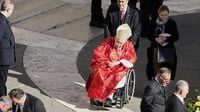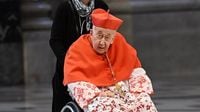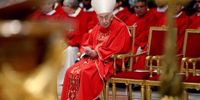As the Catholic Church prepares for its next papal election, Cardinal Camillo Ruini has outlined the qualities necessary for the future Pope. In a recent interview with the Corriere della Sera, the 94-year-old cardinal emphasized the need for a leader who is not only good and deeply believing but also skilled in governance, particularly in these delicate and dangerous international times.
Ruini expressed that a charitable approach is essential, particularly in managing the Church. “Servirà un Papa buono, profondamente credente, dotato di attitudine nelle questioni di governo, capace di affrontare una fase internazionale delicatissima e molto pericolosa. E servirà un Papa caritatevole. Caritatevole anche nella gestione della Chiesa,” he stated.
He also noted that the next Pope can emerge from anywhere around the globe. However, he pointed out that Italians often have the advantage of being less influenced by their origins, which allows them to be more universal in their outlook. “Di solito gli italiani hanno il vantaggio di essere meno condizionati dalle loro origini. Sono più universalisti,” Ruini explained.
As the Church stands on the brink of a new chapter, Ruini highlighted the pressing need to return the Church to Catholics while remaining open to all. “Bisogna restituire la Chiesa ai cattolici, mantenendo però l’apertura a tutti,” he asserted.
Despite the impression that the funerals of Pope Francis resolved the longstanding issue of division within the Church, Ruini believes that the rift remains. “Purtroppo la divisione è rimasta, con il paradosso per cui favorevoli a Francesco sono per lo più i laici mentre contrari sono spesso i credenti,” he remarked, indicating that those who supported Francis were mainly laypeople, while many believers felt alienated.
Ruini pointed out that Pope Francis's missionary intent seemed to favor those distant from the Church, which led to irritation among traditionalists. “Francesco è sembrato cioè privilegiare i lontani a scapito dei vicini,” he noted, suggesting that this approach may have alienated some who have long defended Catholic positions.
In his analysis, Ruini emphasized the importance of addressing the division within the Church with care and prudence. “Davanti al popolo diviso tra chi vuole mantenere i valori tradizionali e chi vuole aprirsi al mondo di oggi bisogna agire con prudenza,” he advised, stressing the need for a balanced approach.
While Ruini does not foresee a schism, he acknowledges the risks posed by theologians who take positions contrary to Catholic orthodoxy. “La questione più pericolosa è però un’altra, poco visibile all’esterno,” he warned, indicating that the internal divisions could lead to serious consequences for the Church.
Ruini also reflected on the media representation of Pope Francis's funeral, noting that the central element of the Church is Christ, not the Pope. He compared the public's reaction to the deaths of previous popes, stating, “Alla morte di Wojtyla la gente urlava ‘santo subito’, mentre alla morte di Bergoglio ha urlato ‘grazie Francesco’.” This shift in sentiment underscores the need to maintain a focus on the transcendent aspects of faith.
As the Conclave approaches, set to begin on May 7, 2025, Ruini’s call to action resonates strongly. “Ricostruire l’unità della Chiesa, specialmente l’unità attorno al Papa, che è il punto di riferimento della comunità cattolica,” he stated, emphasizing the task ahead of the new Pope.
He acknowledged that divisions within the Church date back to the times of Pope Paul VI and that the challenge of unity is ongoing. “È vero che le divisioni risalgono già ai tempi di Paolo VI e che Francesco si inserisce nella lunga serie dei Papi contestati,” he remarked, suggesting that while overcoming these divisions may be difficult, it is essential.
Moreover, Ruini highlighted that the next Pope inherits a Church facing numerous challenges, including the ongoing issue of clerical abuse. He expressed that while Bergoglio aimed to purify the Church, he did not intend to destruct it. “Secondo me Bergoglio voleva purificare, non destrutturare,” he said, referring to the significant problems the Church has faced.
In closing, Ruini reiterated the importance of fueling the flame of faith, which is waning in many regions. He quoted former Pope Benedict XVI, saying, “E non è detto che il nuovo Papa riuscirà a superarla,” indicating that the challenges ahead are formidable.
Ultimately, Ruini believes that the tools available to the new Pope will include both the proclamation of faith and the practice of charity. “È per la carità praticata dalla Chiesa che la gente ama e si fida di essa,” he concluded, emphasizing that love, forgiveness, and understanding are fundamental to the Church’s mission.



